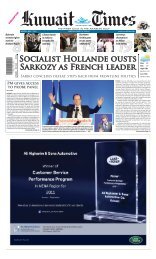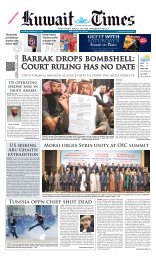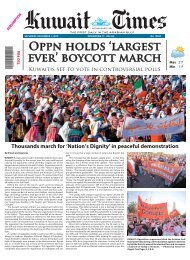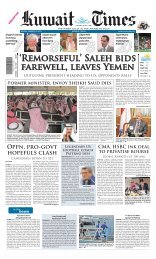ARAb StAtES diSMAyEd At WESt'S cOMPlAcENcy - Kuwait Times
ARAb StAtES diSMAyEd At WESt'S cOMPlAcENcy - Kuwait Times
ARAb StAtES diSMAyEd At WESt'S cOMPlAcENcy - Kuwait Times
Create successful ePaper yourself
Turn your PDF publications into a flip-book with our unique Google optimized e-Paper software.
SATURDAY, MAY 4, 2013<br />
business<br />
Turks see red over<br />
airline lipstick ban<br />
Turkish consortium wins tender for third Istanbul airport<br />
BRUSSELS: EU commissioner Economic and<br />
Monetary Affairs Olli Rehn gives a press conference<br />
on the spring European Economic Forecast yesterday.<br />
— AP<br />
France to get more<br />
time to cut deficit<br />
BRUSSELS: France will get two more years to meet its budget<br />
deficit target because of the country’s poor economic outlook<br />
within a recession-hit euro zone, the European<br />
Commission said yesterday. Presenting economic forecasts<br />
for the next two years, Olli Rehn, the European monetary<br />
affairs ommissioner, also confirmed earlier statements that<br />
Spain would get the same leeway.<br />
Others, including the Netherlands, Slovenia and non<br />
euro-zone Poland, are likely to get a year more to get their<br />
budget gaps below the 3 percent of gross domestic product<br />
European Union ceiling. The formal decision will be<br />
announced on May 29, when the Commission will make<br />
macroeconomic recommendations.<br />
“France badly needs to unlock its growth potential and<br />
create jobs,” he said as he announced that Spain, Italy and<br />
the Netherlands as well as France - four of the euro zone’s<br />
five largest economies - would remain in recession this year.<br />
The granting of more time is a victory for French President<br />
Francois Hollande, who won elections promising a focus on<br />
growth and less on austerity but has little to show for his<br />
economic policies after a year in office.<br />
The extra time also underlines a shift of focus in the 17<br />
countries that share the euro from sharp fiscal consolidation<br />
in the first years of the sovereign debt crisis to economic<br />
growth, as earlier radical deficit cuts and European Central<br />
Bank action restored some market trust in euro zone<br />
finances. EU finance ministers had given France until this<br />
year to bring down its budget shortfall below 3 percent of<br />
GDP and set the deadline for Spain for 2014. But while<br />
France expects its economy to expand by 0.1 percent this<br />
year, the European Commission forecast a 0.1 percent contraction.<br />
“The recovery is now expected to be delayed... The<br />
French growth forecast is in our view overly optimistic,”<br />
Rehn told a news conference. France repeated yesterday it<br />
would bring the deficit below 3 percent in 2014, only one<br />
year later than the original deadline, but a finance ministry<br />
official said the<br />
Germany’s cautious approval<br />
The euro-zone as a whole will shrink more than expected<br />
this year and budget deficits in most countries will therefore<br />
decline more slowly, Rehn said, as the bloc struggles in its<br />
second year of contraction and its second recession since<br />
2009. Of the large countries only Germany, the largest euro<br />
zone economy, will manage to eke out 0.4 percent growth,<br />
even if less than the earlier expected 0.5 percent.<br />
It sees budget austerity as necessary to bring down bloated<br />
public accounts after a decade of credit-fuelled spending<br />
across much of Europe, even if many economists say such<br />
austerity has deepened the euro zone’s recession.<br />
Chancellor Angela Merkel’s spokesman Steffen Seibert gave<br />
only cautious approval to the Commission’s planned extensions,<br />
saying each country must be “checked on an individual<br />
basis”. The Commission now believes that the euro zone<br />
economy will shrink 0.4 percent this year and grow 1.2 percent<br />
next year, against projections from last February of a 0.3<br />
percent recession and 1.4 percent growth respectively. This<br />
is roughly in line with forecasts from the European Central<br />
Bank. “We must do whatever it takes to overcome the unemployment<br />
crisis in Europe. Fiscal consolidation is continuing,<br />
but its pace is slowing down,” Rehn said, referring to the<br />
record 19 million people out of work in the euro zone in<br />
March. — Reuters<br />
ISTANBUL: Turkey’s national airline has<br />
barred female flight attendants from wearing<br />
red lipstick and nail polish, striking a<br />
nerve among secular Turks worried the<br />
country is becoming more Islamic. Turkish<br />
Airlines, Europe’s fourth-biggest carrier,<br />
said the ban was aimed at keeping crews<br />
“artless and well-groomed with makeup in<br />
pastel tones”, as a natural look improved<br />
communication with passengers. “As a<br />
consequence of our current cabin uniforms<br />
not including red, dark pink, et<br />
cetera, the use of lipstick and nail polish in<br />
these colours by our cabin crew impairs<br />
visual integrity,” the statement said.<br />
Turkish Airlines declined a request for<br />
further comment. The guideline follows<br />
other restrictions on employees’ appearance<br />
and on serving alcohol. Critics say<br />
they reflect the influence of the government’s<br />
conservative religious values at the<br />
fast-growing state-run airline, one of<br />
Turkey’s most recognised brands. “This<br />
new guideline is totally down to Turkish<br />
Airlines management’s desire to shape the<br />
company to fit its own political and ideological<br />
stance,” <strong>At</strong>ilay Aycin, president of<br />
the airline’s Hava-Is labour union, told<br />
Reuters.<br />
“No one can deny that Turkey has<br />
become a more conservative, religious<br />
country.” Turkey is 99 percent Muslim but<br />
the NATO state and European Union candidate<br />
has a secular constitution. Prime<br />
Minister Tayyip Erdogan’s ruling AK Party,<br />
which traces its roots to a banned Islamic<br />
party, has relaxed the state’s control over<br />
the expression of religion, such as oncestrict<br />
limits imposed on wearing the<br />
Islamic-style headscarf.<br />
Such restrictions were aimed at reining<br />
in Islamism and improving women’s<br />
rights, but effectively prevented many<br />
devout women from studying at university<br />
or taking government jobs. Turkish<br />
Airlines scrapped its own ban on the headscarf<br />
more than a year ago, and covered<br />
women now work at check-in counters<br />
and at other positions in the company,<br />
Aycin said. Other Turkish carriers also have<br />
guidelines on the appearance of cabin<br />
personnel.<br />
MUMBAI: India’s central bank cut its main<br />
interest rate by 25 basis points yesterday<br />
in the third such move this year, but said<br />
there was “little space” for further reductions<br />
to help the slowing economy. After<br />
meeting in the financial capital Mumbai,<br />
the Reserve Bank of India (RBI) said that<br />
the benchmark repo rate, at which it lends<br />
to commercial banks, would fall to 7.25<br />
percent, as expected by most economists.<br />
After the decision, India’s Finance Minister<br />
P. Chidambaram, said that there was<br />
“scope for more rate cuts, if inflation came<br />
down further”.<br />
India’s headline inflation eased to a<br />
three-year-low of 5.96 percent in March,<br />
but the consumer price index is at 10.39<br />
percent, led mainly by high food prices.<br />
Explaining the rate cut, the RBI governor<br />
Duvvuri Subbarao said that “growth had<br />
decelerated continuously,” forecasting<br />
expansion of 5.7 percent in the new fiscal<br />
year-far below the government’s estimate<br />
of 6.0-6.5 percent. But Subbarao warned<br />
that there were “significant risks” to inflation<br />
in the near-term and said that “monetary<br />
policy cannot afford to lower its guard<br />
against the possibility of a resurgence of<br />
inflation pressures”.<br />
The governor also struck a cautious<br />
tone about future rate cuts, saying:<br />
“Overall, the balance of risks stemming<br />
from our assessment of the growth-inflation<br />
dynamics yields little space for further<br />
monetary easing.” The RBI’s decision to cut<br />
rates had been forecast by economists<br />
and business leaders, who have been calling<br />
for lower borrowing costs to help the<br />
economy, which grew at an estimated 5.0<br />
percent in the full year to March.<br />
Indian shares fell as much as 0.91 percent<br />
to 19,555.05, reacting to the news<br />
that further rate cuts were unlikely in coming<br />
months, but recovered marginally to<br />
19,613.10 points, down 0.62 percent. The<br />
cash reserve ratio-the percentage of<br />
deposits banks must keep with the central<br />
bank-was kept unchanged.<br />
The RBI’s decision to cut rates had been<br />
forecast by economists and business leaders,<br />
who have been calling for lower borrowing<br />
costs to help the economy, which<br />
grew at an estimated 5.0 percent in the<br />
full year to March. But they are unsure<br />
when the next rate cut could come.<br />
Goldman Sachs chief India economist<br />
Tushar Poddar expects the RBI to proceed<br />
slowly with future rate cuts. “The forward<br />
guidance suggests to us that the RBI is<br />
unlikely to cut again in its next policy<br />
meeting (of June 17),” he said.<br />
But Nomura economist Sonal Varma<br />
said that: “Given the recent fall in commodity<br />
prices, upside risks to inflation are<br />
likely to remain contained... creating more<br />
space for future rate cuts,” in a note to<br />
clients. Industry body Associated<br />
Chambers of Commerce and Industry of<br />
India (Assocham) criticised the RBI for<br />
being “over-cautious” on potential risks to<br />
India’s economy.<br />
“While there is a lot the government<br />
should do to improve governance, the RBI<br />
should not wash its hands off at the cost of<br />
economic growth, which is a must for fulfilling<br />
aspirations of the people,”<br />
Assocham president Rajkumar Dhoot said.<br />
The RBI yesterday reiterated that the government<br />
should take measures to encourage<br />
investment, as policy action was not<br />
enough to stimulate the economy.<br />
Subbarao said the biggest risk to<br />
India’s economy came from the current<br />
account deficit, which widened to a record<br />
6.7 percent of GDP in the December quarter.<br />
The government, led by Prime Minister<br />
Hidden agenda?<br />
The flag carrier caused a stir earlier this<br />
year when newspapers published mockups<br />
of a new Ottoman-style uniform for<br />
stewardesses with ankle-length dresses, a<br />
proposal the airline’s management<br />
appears to have since abandoned. That<br />
was followed by a ban on alcohol on<br />
planes flying to most domestic destinations<br />
and some Islamic countries.<br />
“They are objecting to the lipstick and<br />
nail polish that we have been using for<br />
years,” said Asli Gokmen, 30, a flight attendant<br />
who lost her job with more than 300<br />
others last year during a union protest and<br />
is petitioning for her position back. No current<br />
employees were available for comment.<br />
Turks worried the government is<br />
undermining the country’s secular order<br />
see a hidden agenda. On Twitter, women<br />
posted pictures after applying red lipstick.<br />
One wrote: “Why not just ban stewardesses<br />
altogether so we can all breathe a sigh<br />
of relief?”<br />
Some male Twitter users were indignant<br />
over the insinuation that red lipstick<br />
would induce a sexual frenzy. Turkish<br />
Airlines passenger Ahmet Yerli, 33, said he<br />
did not think the new guideline was a sign<br />
of creeping Islamisation but that the ban<br />
was still “absurd.” “I’ve never heard of a<br />
plane crashing because of a women’s lipstick,”<br />
he said before his flight.<br />
In another development, a consortium<br />
of Turkish construction firms won a tender<br />
yesterday to build and operate a planned<br />
third airport in Istanbul which Turkey says<br />
could eventually be the world’s largest,<br />
bidding 22 billion euros ($29 billion) for<br />
the project. —Agencies<br />
India’s central bank cuts rate<br />
Manmohan Singh, has been battered by a<br />
spate of corruption scandals and is keen to<br />
revive economic growth before facing voters<br />
in general elections due in 2014. The<br />
World Bank on Tuesday lowered its forecast<br />
for growth to 6.1 percent for the new<br />
fiscal year which started in April, from the<br />
7.0 percent projected six months ago. The<br />
RBI slashed rates by 25 basis points at its<br />
previous two meetings in March and<br />
January. Rates had previously been on<br />
hold for nine months. — AFP<br />
MUMBAI: An Indian security guard<br />
stands at the gate of the Reserve<br />
Bank of India (RBI) yesterday. —AP
















